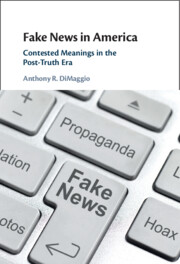Book contents
- Fake News in America
- Fake News in America
- Copyright page
- Dedication
- Contents
- Figures
- Tables
- Contributors
- Acknowledgments
- Introduction
- 1 The Age of Post-Truth Politics
- 2 The Phenomenon of Fake News, Part 1
- 3 The Phenomenon of Fake News, Part 2
- 4 The Phenomenon of Fake News, Part 3
- 5 Fake News as Propaganda
- 6 Fake News and US Foreign Policy in the Trump Era
- 7 The Intensifying Fake News Crisis in the Age of Social Media
- Conclusion
- Bibliography
- Index
6 - Fake News and US Foreign Policy in the Trump Era
Published online by Cambridge University Press: 30 August 2023
- Fake News in America
- Fake News in America
- Copyright page
- Dedication
- Contents
- Figures
- Tables
- Contributors
- Acknowledgments
- Introduction
- 1 The Age of Post-Truth Politics
- 2 The Phenomenon of Fake News, Part 1
- 3 The Phenomenon of Fake News, Part 2
- 4 The Phenomenon of Fake News, Part 3
- 5 Fake News as Propaganda
- 6 Fake News and US Foreign Policy in the Trump Era
- 7 The Intensifying Fake News Crisis in the Age of Social Media
- Conclusion
- Bibliography
- Index
Summary
Chapter 6 examines two case studies from the Trump years involving allegations of “fake news” – Russiagate and Ukrainegate. I review the historical timelines of each case study, documenting the allegations made against Trump. With the social construction of reality, the way presidential scandals are reported is integral to reinforcing or contesting Americans’ beliefs regarding perceptions of a given scandal. With Russiagate, the president’s critics speculated with worst-case scenarios about collusion with Russia, and much of the media coverage of the controversy was heavily critical of Trump, despite right-wing media downplaying the notion that a scandal occurred. Regarding concerns with fake news, I document how critical reporting on Russiagate had significant consequences in terms of cultivating increased suspicion of a sitting president. For Ukrainegate, I document how the president engaged in an abuse of power, and that critical reporting recognized this abuse, thereby undermining Trump’s claim that reporting on the scandal was “fake news.” Critical reporting was associated with increased suspicion of the president among heavier media consumers. Finally, I document the role of social media in impacting how people think about scandals of the Trump era, with evidence of a balkanization–“echo chamber” effect between Democratic and Republican users.
- Type
- Chapter
- Information
- Fake News in AmericaContested Meanings in the Post-Truth Era, pp. 153 - 182Publisher: Cambridge University PressPrint publication year: 2023



